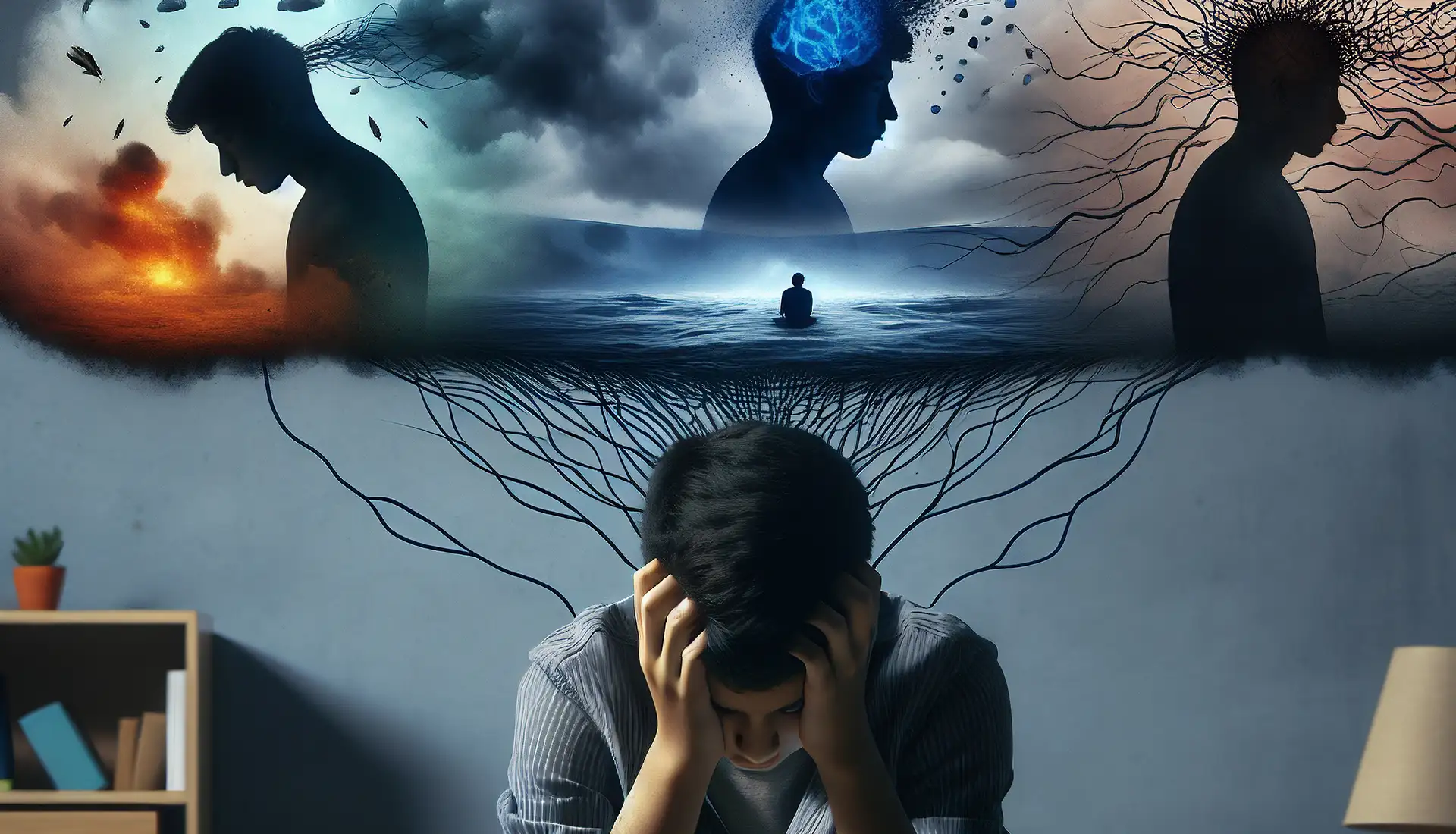Struggling with anxiety and looking for ways to manage it? This guide outlines the best treatment options for anxiety, including psychotherapy, medication, lifestyle changes, and alternative therapies. Whether you’re considering cognitive behavioral therapy, SSRIs, or herbal remedies, we cover all your options to help you find effective relief.
Key Takeaways
- Psychotherapy, including Cognitive Behavioral Therapy (CBT) and exposure therapy, serves as a fundamental approach for effectively managing anxiety disorders.
- Medication management, particularly the use of SSRIs and benzodiazepines, plays a crucial role in anxiety treatment, with careful consideration required to mitigate risks.
- Alternative therapies such as herbal remedies, Mindfulness-Based Cognitive Therapy (MBCT), and lifestyle changes can complement traditional treatments to enhance overall anxiety management.
Psychotherapy for Anxiety Disorders
Psychotherapy stands as a cornerstone in the treatment of anxiety disorders, offering a range of techniques to help individuals manage their symptoms and improve their quality of life. A mental health professional can guide patients through various forms of therapy, each designed to target specific aspects of panic disorder and anxiety.
From cognitive behavioral therapy (CBT) to exposure therapy, these psychological therapies are integral to a comprehensive treatment plan.
Cognitive Behavioral Therapy (CBT)
Cognitive Behavioral Therapy (CBT) effectively treats anxiety disorders by identifying and altering negative thought patterns and behaviors. Working with a mental health professional helps individuals challenge anxiety-provoking thoughts and develop healthier coping mechanisms. Recent meta-analyses show a smaller effect size in newer studies, but CBT remains fundamental in treating mental health conditions.
CBT’s effectiveness lies in its structured approach, equipping patients with practical skills to manage anxiety. This talk therapy reduces anxiety and promotes overall mental health by addressing conditions like depression and obsessive-compulsive disorder.
Exposure Therapy
Exposure therapy effectively treats anxiety disorders by gradually exposing individuals to anxiety-inducing situations, helping them confront and reduce their fears. Systematically facing fears instead of avoiding them helps patients diminish anxiety and discomfort.
This therapy benefits those with specific phobias, post-traumatic stress disorder, and social anxiety disorder. Gradual exposure techniques reduce avoidance behaviors common in anxiety disorders. As patients become accustomed to feared situations, their anxiety decreases, leading to improved mental health and well-being.
Online Therapies
Online therapies offer a flexible and accessible option for treating anxiety disorders, providing a convenient alternative for those unable to attend in-person sessions. The rise of telehealth allows mental health professionals to offer cognitive behavioral therapy, exposure therapy, and other treatments online.
Online therapies offer greater accessibility and the convenience of receiving treatment from home. This approach particularly benefits those with severe anxiety or social anxiety disorder by reducing barriers to seeking help.
Leveraging technology, online therapies make it easier to access effective treatments and manage anxiety.
Medication Management
Medication management is crucial in treating anxiety disorders and is often used alongside psychotherapy. Consulting a mental health professional provides guidance on the most appropriate treatments based on an individual’s medical history and needs.
Various pharmacological treatments are available, each with its benefits and potential side effects.
Selective Serotonin Reuptake Inhibitors (SSRIs)
Selective Serotonin Reuptake Inhibitors (SSRIs) are commonly prescribed as the first-line treatment for anxiety disorders, working by increasing serotonin levels in the brain to elevate mood and regulate emotions. SSRIs typically require several weeks to show full effects, often taking up to 12 weeks to reach maximum potential.
While generally considered safe, SSRIs come with potential side effects, particularly in young populations where there is a risk of increased suicidal thoughts. Despite these concerns, SSRIs remain popular for treating anxiety due to their effectiveness and favorable safety profile, especially in older adults.
Benzodiazepines
Benzodiazepines offer quick relief from anxiety symptoms and are another class of medications used to treat anxiety disorders. Enhancing GABA activity in the brain, benzodiazepines promote a calming effect, beneficial during acute anxiety episodes. However, their use carries significant risks, including potential dependency and cognitive impairments.
Due to dependence risk, benzodiazepines are generally prescribed for short-term use or as needed. Long-term use can lead to tolerance, requiring higher doses to achieve the same effect, increasing dependency risk. Careful consideration and professional guidance are crucial when using benzodiazepines for anxiety treatment.
Other Pharmacological Treatments
Aside from SSRIs and benzodiazepines, medications like Serotonin-Norepinephrine Reuptake Inhibitors (SNRIs), pregabalin, and buspirone offer alternative anxiety management options. SNRIs, known for their dual action on serotonin and norepinephrine, are effective for a range of anxiety disorders.
Pregabalin and buspirone are additional options, each with distinct efficacy and side effects. Buspirone, a non-benzodiazepine medication, helps alleviate anxiety without the sedative effects associated with benzodiazepines.
These alternatives offer more options for individuals seeking effective anxiety treatments.

Alternative and Complementary Therapies
Alternative and complementary therapies provide additional avenues for managing anxiety disorders. These non-traditional approaches complement conventional treatments, offering a holistic approach to anxiety management.
Herbal remedies and lifestyle changes can enhance overall well-being and reduce anxiety symptoms.
Herbal Remedies
Herbal remedies are becoming popular among those seeking natural alternatives for managing anxiety. Lavender oil, known for its calming effects, and Kava-kava, traditionally used to alleviate anxiety, are commonly used herbal treatments. Despite their popularity, further research is needed to confirm their safety and effectiveness.
While herbal remedies can offer relief, consulting a healthcare provider before starting any new treatment is important. This ensures the chosen remedy won’t interact with other medications or exacerbate existing health conditions.
Mindfulness-Based Cognitive Therapy (MBCT)
Mindfulness-Based Cognitive Behaviour Therapy (MBCT) combines mindfulness practices with cognitive behaviour therapy to manage anxiety more effectively. Promoting awareness of thoughts and feelings in a non-judgmental way, MBCT helps individuals respond to anxiety-provoking situations with greater calm and clarity.
This therapy is particularly effective for those with recurrent anxiety episodes. Integrating mindfulness techniques, MBCT helps break the cycle of anxiety and develop healthier responses to stress and triggers.
Lifestyle Changes
Lifestyle changes like incorporating regular physical activity and maintaining a balanced diet significantly support anxiety management. Exercise reduces anxiety symptoms, while a diet rich in fruits and vegetables contributes positively to overall mental health.
These changes can enhance the effectiveness of other treatments and promote long-term well-being. Setting realistic goals for physical activity and choosing nutrient-dense foods can help individuals implement these changes into their daily lives.
Self-Help Strategies and Support Groups
Self-help strategies and support groups play a vital role in managing anxiety disorders. These approaches empower individuals to control their anxiety and connect with others facing similar challenges, including resources from the anxiety and depression association.
Breathing techniques and muscle relaxation can be highly effective in reducing anxiety symptoms.
Breathing Techniques
Breathing techniques like deep and slow breathing can significantly reduce anxiety and promote relaxation. These exercises help calm the nervous system and activate the body’s relaxation response, making them valuable for managing anxiety.
Regularly practicing controlled breathing exercises helps individuals develop a sense of calm and improve overall mental health. Techniques like diaphragmatic breathing and the 4-7-8 method can be easily incorporated into daily routines.
Muscle Relaxation
Muscle relaxation techniques like progressive muscle relaxation involve tensing and then relaxing different muscle groups to alleviate physical tension linked to anxiety. This method reduces muscle tension and promotes a sense of calm.
Practicing muscle relaxation exercises is particularly beneficial for those with physical symptoms of anxiety, such as muscle tension and headaches. Regularly engaging in these exercises improves stress management and overall well-being.
Support Groups
Support groups offer a valuable opportunity for individuals with anxiety to connect with others facing similar challenges. These groups offer emotional support, reduce feelings of isolation, and encourage mutual understanding.
Participating in support groups helps individuals feel more connected and less alone in their struggles. The sense of community and shared experiences motivates individuals to seek help and make positive changes.
Special Considerations for Specific Populations
Certain populations, such as pregnant women, children, adolescents, and older adults, require special considerations when treating anxiety disorders. Tailored approaches address the unique needs and challenges faced by these groups.
Pregnancy and Postnatal Anxiety
Anxiety disorders are prevalent during pregnancy, making early intervention crucial to ensure the health of both mother and child. Managing anxiety during pregnancy requires careful strategies prioritizing safety and well-being. Promptly addressing anxiety symptoms is important, as untreated anxiety can impact both maternal and fetal health.
Safe and effective treatments like psychotherapy and certain medications help manage anxiety during this critical period.
Treating Children and Adolescents
Cognitive Behavioral Therapy (CBT) is the primary treatment for anxiety disorders in children and adolescents, with evidence supporting its effectiveness across various anxiety types. Age-appropriate CBT helps young individuals develop coping skills to manage anxiety.
While CBT is highly effective, concerns about using SSRIs in young populations persist due to potential side effects. Therefore, psychotherapy is often the preferred approach for treating anxiety in children and adolescents.
Anxiety Treatment in Older Adults
Older adults may respond differently to anxiety treatments due to age-related physiological changes. Potential side effects of medications can be more pronounced, necessitating careful dosage management. Adjustments in therapy approaches and close monitoring are essential when treating anxiety in older adults.
By considering their overall health and medication interactions, effective and safe treatment plans can be developed.
Addressing anxiety disorders requires a multifaceted approach that includes psychotherapy, medication management, and alternative therapies. Effective treatment begins with understanding the unique needs of each individual and developing a tailored treatment plan. Cognitive Behavioral Therapy (CBT) and exposure therapy remain cornerstone treatments, while online therapies offer flexibility and accessibility. Medication management, including SSRIs and benzodiazepines, provides pharmacological support, but must be carefully monitored to avoid dependency and side effects.
Complementary therapies, such as herbal remedies, mindfulness practices, and lifestyle changes, offer additional support for managing anxiety. Self-help strategies and support groups empower individuals to take control of their mental health and build supportive communities. Special considerations for specific populations, such as pregnant women, children, and older adults, ensure that treatments are safe and effective. By leveraging these diverse treatment options, individuals can achieve better mental health outcomes and lead fulfilling lives.
Frequently Asked Questions
What is the 3 3 3 rule for anxiety?
The 3 3 3 rule for anxiety is an effective grounding technique that involves identifying three things you can see, three sounds you can hear, and moving three body parts. This method helps redirect your focus and manage overwhelming anxiety by anchoring you in the present moment.
What is the most effective therapy for anxiety disorders?
Cognitive Behavioral Therapy (CBT) is considered the most effective therapy for anxiety disorders, as it aids individuals in transforming negative thought patterns and behaviors that exacerbate anxiety. This approach has a strong evidence base supporting its efficacy in treatment.
How long do SSRIs take to work for anxiety?
SSRIs generally take several weeks to become effective for anxiety, with full therapeutic effects often observed after up to 12 weeks. Patience is essential during this period as the medication begins to work.
Are there natural alternatives to medication for managing anxiety?
Yes, natural alternatives for managing anxiety include herbal remedies, mindfulness-based cognitive therapy (MBCT), and various lifestyle changes. These approaches can effectively complement traditional treatments for anxiety.




